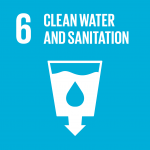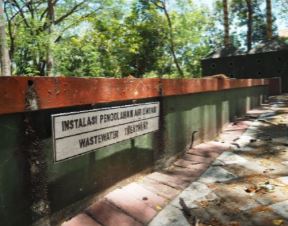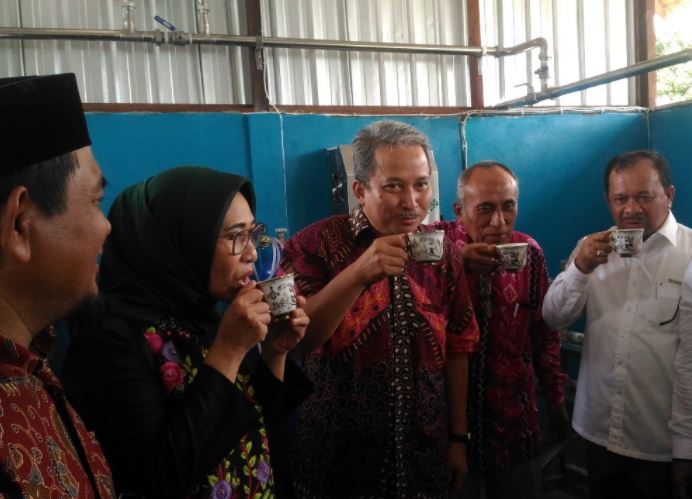“Without water we can’t live. Water supports out agriculture and aquaculture. Clean water is vital. However, due to bad economics or poor infrastructure, millions of people including children die every year from diseases associated with inadequate water supply, sanitation and hygiene.”
(THE Impact Rankings)
SDG 6: CLEAN WATER AND SANITATION
Water Consumption per Person
ITS Water Consumption 2020
Efficiency in water use is becoming one of the priorities of ITS Campus. ITS measures the total volume of water used in the university regularly. Water consumption is tracked from several water meters installed within the campus area.
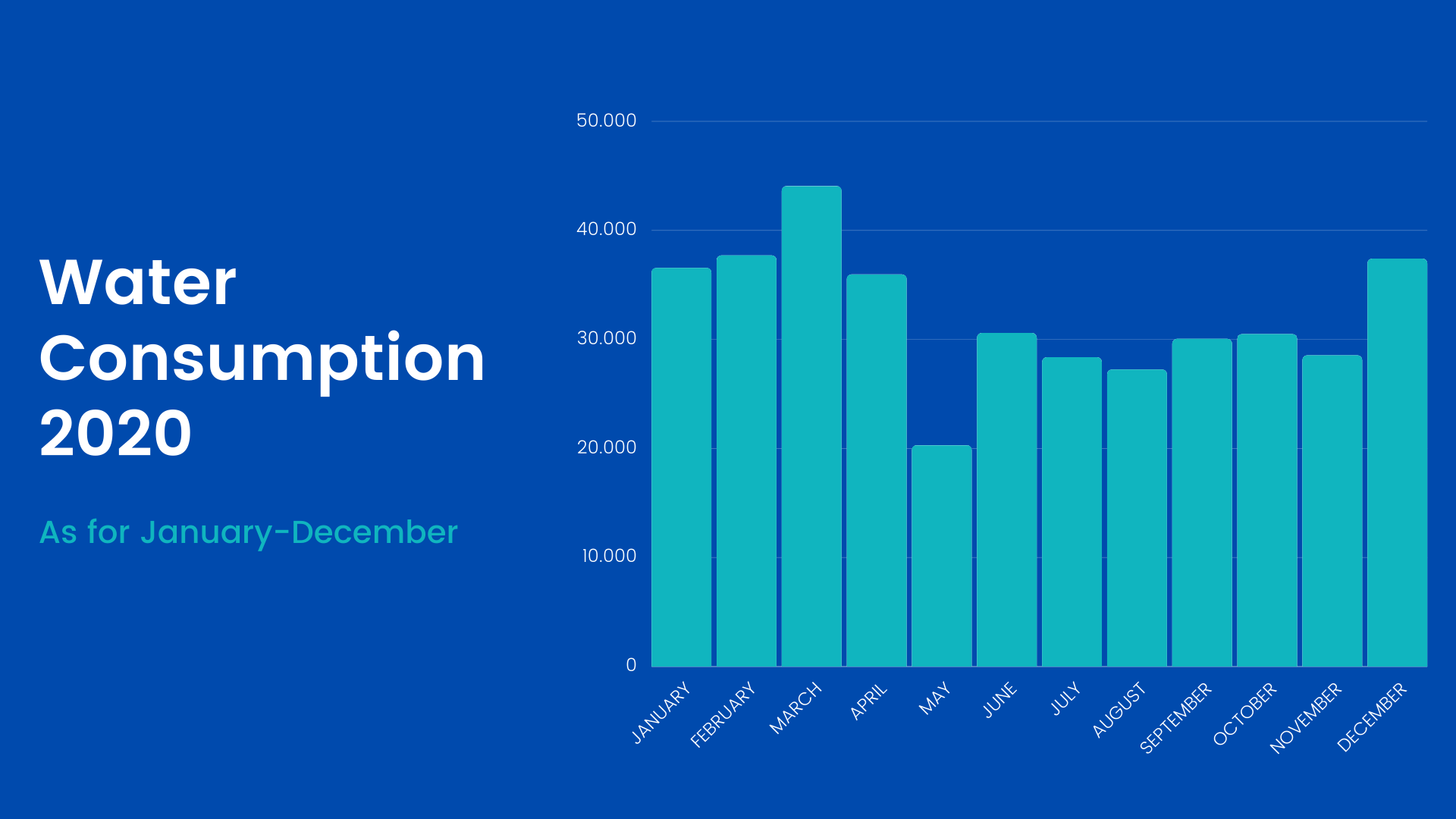
ITS Recycles Water from Campus Mosque
The Manarul Ilmi Mosque as the only mosque in the ITS campus area uses a lot of water in its operations. At least 25-30 m3 of water every day is used by the congregation for washing. In 2013 to coincide with the renovation of the mosque’s ablution place, an initiative arose from the construction committee to recycle used water for ablution for the purpose of watering plants.
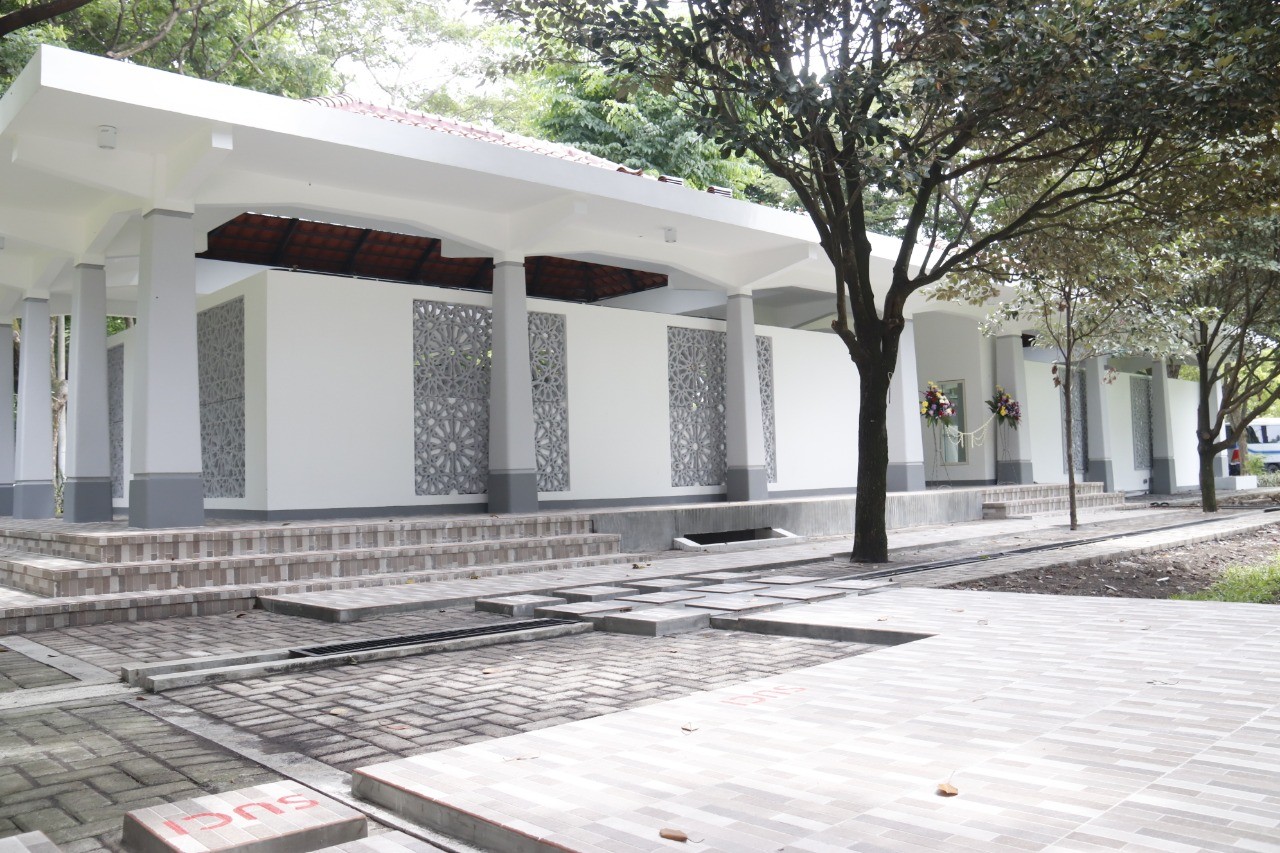
Water Usage and Care
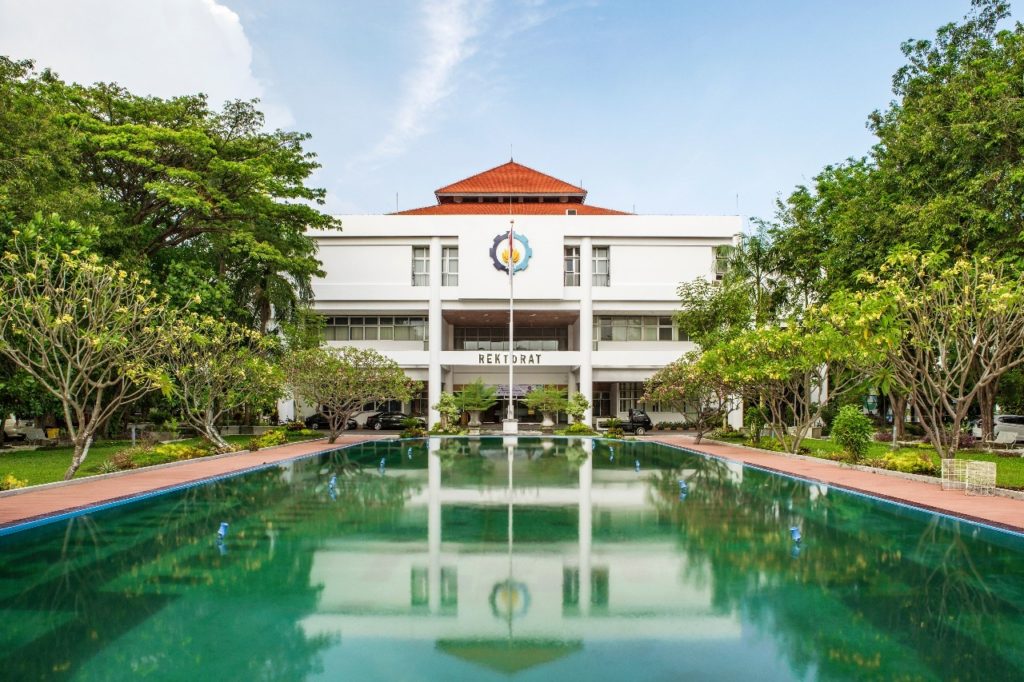
ITS always strives to support SDGs which is very important for life in the campus area. One of them is waste water management. Waste water management at ITS is regulated in Circular Letter of ITS Rector No. T-95007-IT2-TU.00.08-2019 about ITS’ Initiatives towards Sustainable and Environmental Friendly Campus, item A, where in point 3 it is explained that the ITS family strives to encourage efforts to save water by avoiding unnecessary water use and encouraging efforts to utilize water return of wastewater for watering activities, then at point 9 which is to encourage efforts to manage domestic wastewater by managing and recycling efforts. Through this policy, during 2020, there are records of the use and management of wastewater in the ITS environment. Waste water management at ITS is carried out through the installation of Anaerobic Baffled Reactor (ABR) Wastewater Management (IPAL) or simple WWTP using grease traps and settling ponds.
In addition, it is also recorded in the ITS Hazardous and Toxic Waste (B3) report which 50-75% is handled separately by grouping, collecting and submitting B3 originating from the Department of Chemical Engineering, Environmental Engineering, Chemistry, Materials, Biology, Machinery and Laboratories. Energy and Environment to a certified third party.

Sometimes, pollution is already present in the water system, so efforts are needed to reduce the pollutants already present in the system and prevent pollution in the water system in the future. One of the efforts made by the ITS team, namely the Community Service Team (Abmas) under the direction of Prof. Dr. Fahimah Martak M. Si. This Abmas is in the form of a Reverse-Osmosis Membrane Process Application to purify drinking water contaminated with harmful pollutants.
In addition to the examples above, the ITS student team also innovated by designing a domestic waste water treatment plant (WWTP) without emissions (zero emission). The student team, named Grisse, led by Mas Den Rum, designed an WWTP capable of treating domestic waste at once, both gray water and black water. This IPAL has also been built as a medium for community empowerment in RT 19/RW 02, Kroman Village, Gresik Regency.

As one of the big universities, the amount of ITS water consumption in the campus area is also very big. So, ITS seeks to provide Ready-to-drink Water Faucets (KASM) to support ITS flagship program, the Smart Eco Campus. Currently, KASM is provided within the Department of Mechanical Engineering, Engineering Physics, Materials and Metallurgical Engineering, Manarul Ilmi Mosque, and the central parking area. This effort is carried out in collaboration with the Regional Center for Drinking Water (PDAM) of Surabaya City with guaranteed drinking water quality where the Surabaya City Health Office will monitor it once a month. In addition, the quality of drinking water will also be monitored by an independent laboratory that has been certified ISO 17205.

In an effort to support SDGs, ITS enforces a water use policy in the campus environment through Circular Letter of ITS Rector No. T-95007-IT2-TU.00.08-2019 about ITS’ Initiatives towards Sustainable and Environmental Friendly Campus, item A, where in point 3 it is explained that the ITS family strives to encourage efforts to save water by avoiding unnecessary water use and encouraging efforts to utilize water return wastewater for watering activities. In addition, other policies issued by the rector, namely the ITS Rector’s SE No. 08991-IT2-TU.00.08-2012 concerning the Implementation of Saving Energy and Water and Non-Subsidized Fuel in point 1, subpoint 1.2.
Circular Letter of ITS Rector No. T-95007-IT2-TU.00.08-2019

ITS: Green Open Space, Research, and Education
In development activities, environmental management must be a top priority. The existence of forests and parks in ITS is a contributor to the proportion of green open space (RTH) in the Surabaya city area. In addition to beautifying the struggle campus, green space is also used to ensure the balance of urban ecosystems, including the balance of hydrological and microclimate systems as well as other ecosystems, which in turn will increase the availability of clean air that is needed by the community. These efforts are supported by programs such as Urban Farming ITS, which with research and education activities can produce an independent form of local food security system. Routine campus activities through tree planting can also add to the greenness of the ITS campus.
Wonderful Morning at ITS
Not just an ordinary campus, ITS always provides wonderful morning experiences that are ready to accompany your activities on campus. The number of trees and a well-maintained environment will have a positive effect on each occupant.
Tabebuya Blossom at ITS
Find various kinds of supporting facilities that make it easier for every campus activity. There are many choices and facilities provided by ITS and the surrounding environment. Starting from temporary living accommodation such as dormitories to canteens in each Department.
Water Re-Use

ITS always strives to support SDGs which is very important for life in the campus area. One of them is waste water management. Waste water management at ITS is regulated in Circular Letter of ITS Rector No. T-95007-IT2-TU.00.08-2019 about ITS’ Initiatives towards Sustainable and Environmental Friendly Campus, item A, where in point 3 it is explained that the ITS family strives to encourage efforts to save water by avoiding unnecessary water use and encouraging efforts to utilize water return of wastewater for watering activities, then at point 9 which is to encourage efforts to manage domestic wastewater by managing and recycling efforts.
At ITS, the efficiency of water usage was carried out in two ways, that is an efficiency that using dual flush in toilets, as well as using sprinkled water to support smart eco campus program. Dual flush is a toilet watering technology using two flush sizes. Flush with a large size will remove about 6-9 liters of water, while a small flush will remove about 3-4 liters of water.
The second one is water sprinkle technology, a form of efficient use by applying a system that uses the water as little as possible but still can be distributed to the large areas by using the pressure in the pipe. This technology has been applied on watering plants and fields in the ITS area, especially around the Manarul Ilmi ITS Mosque.
Circular Letter of ITS Rector No. T-95007-IT2-TU.00.08-2019
ITS: Water Eficiency
ITS Recycles Water from Campus Mosque

Circular Letter of ITS Rector No. T-95007-IT2-TU.00.08-2019
ITS always strives to support SDGs which is very important for life in the campus area. One of them is waste water management. Waste water management at ITS is regulated in Circular Letter of ITS Rector No. T-95007-IT2-TU.00.08-2019 about ITS’ Initiatives towards Sustainable and Environmental Friendly Campus, item A, where in point 3 it is explained that the ITS family strives to encourage efforts to save water by avoiding unnecessary water use and encouraging efforts to utilize water return of wastewater for watering activities, then at point 9 which is to encourage efforts to manage domestic wastewater by managing and recycling efforts.
Catchment area for water resources management at ITS
ITS is located within Surabaya coastal region in the eastern part of Java Island. It has initial characteristic with wetlands and swamps ecosystem. As a science and technological university, with the main activities in teaching, experimental laboratory works, and student activities, ITS is, currently, using ± 49% of its total vast area as building blocks for supporting academic facilities. Being a campus in a coastal zone, the commonly main problems are high porous soil, brackish surface water, high level of ground water, an obstructed drainage tendency because of delicate slant, and low catchment capability. This paper captures an action program on how ITS manage water resources within campus area in order to suppress environmental damage. Many steps had been taken into account for water catchment role, for instance: maintaining the catchment area on the main ITS master plan, planning catchment pond, surface water stabilization by preventing ground water usage, interrupting drainage water flow as being directly discharged into the city drainage system, rain water harvesting, and also designing floating floor for buildings.
Water in the Community
ITS Lecturers to Overcome Clean Water Problems in Surrounding Area
The availability of clean water is very important for life, but not infrequently people still experience difficulties in fulfilling it due to various things, one of which is pollution. Following up on this, the Community Service Team (Abmas) of ITS helps people in surrounding area of Surabaya to overcome clear water problems.
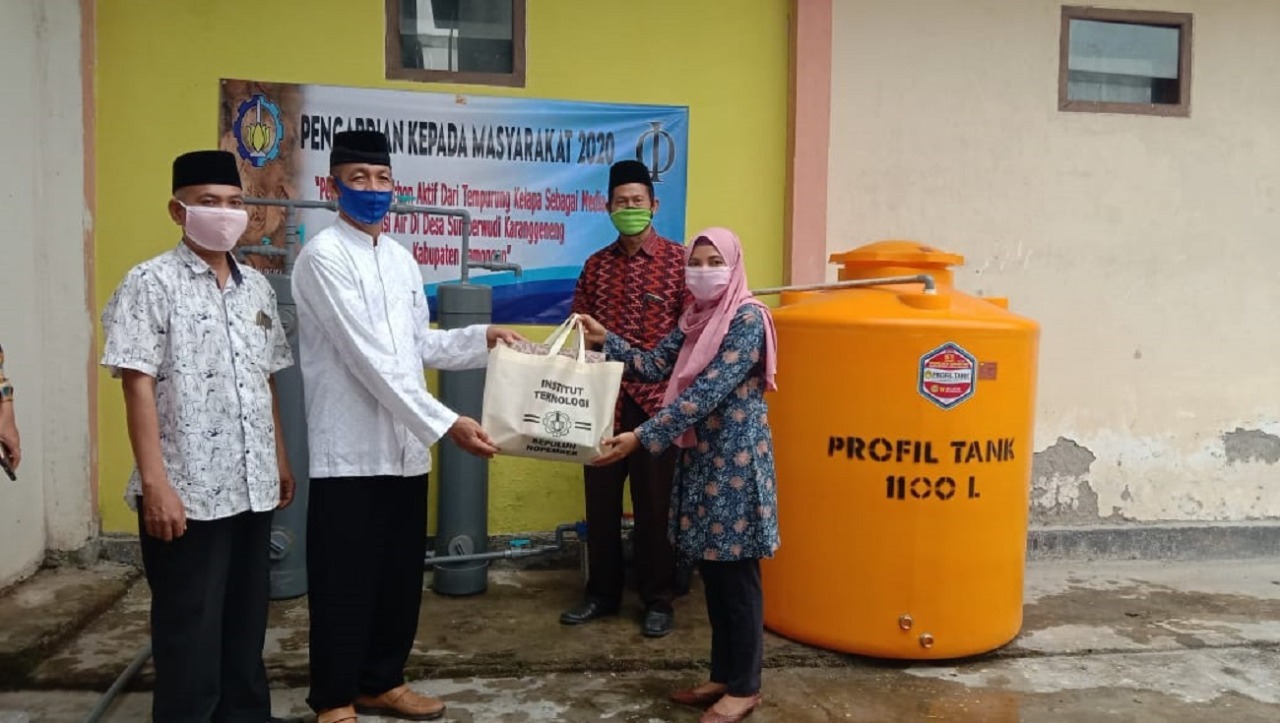
ITS Lecturer Invents Water Filter from Coconut Shells
The Community Service Team (Abmas) of ITS invents a water filter made from coconut shells. Taking the research location in Sumberwudi Village, Karanggeneng District, Lamongan, where the community encounters water pollution problems and difficulties in the process of filtering or filtering water.
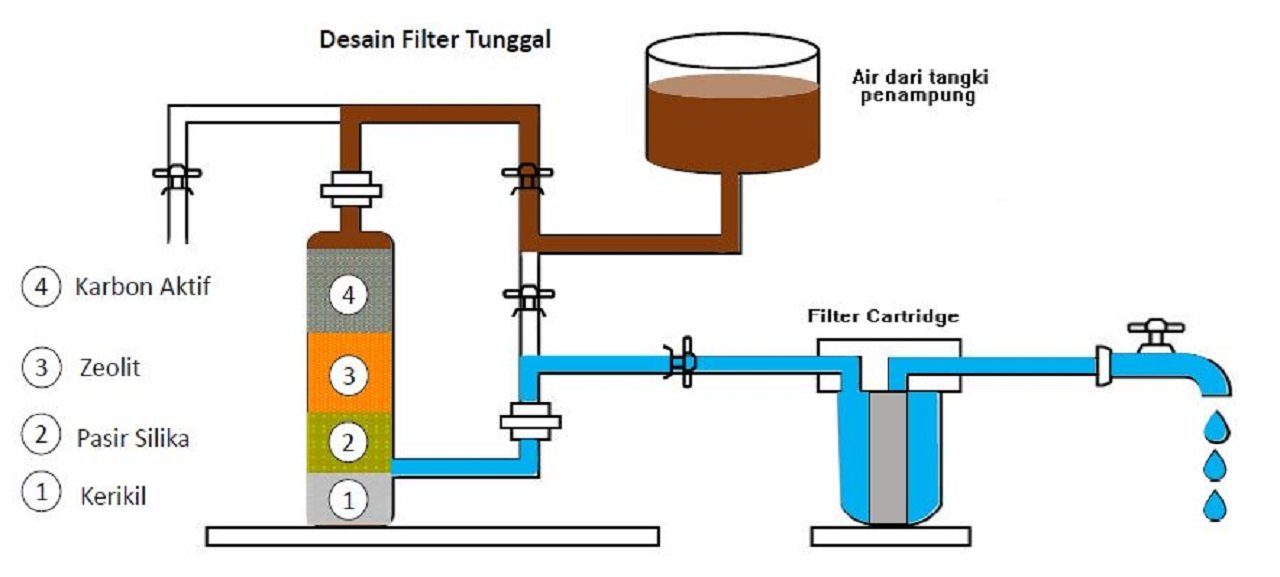
ITS Students Invites Surrounding Communities to Celebrates World Water Day
Water is one of the most vital aspects of human life. Therefore, students of the Department of Environmental Engineering of ITS present an event entitled “Paling Berseri” which involved communities participation in it. The event, which was realized in order to celebrate World Water Day, was successfully held at the Kampung Pacar Keling, Surabaya. This event aims to raise public awareness of water conservation.
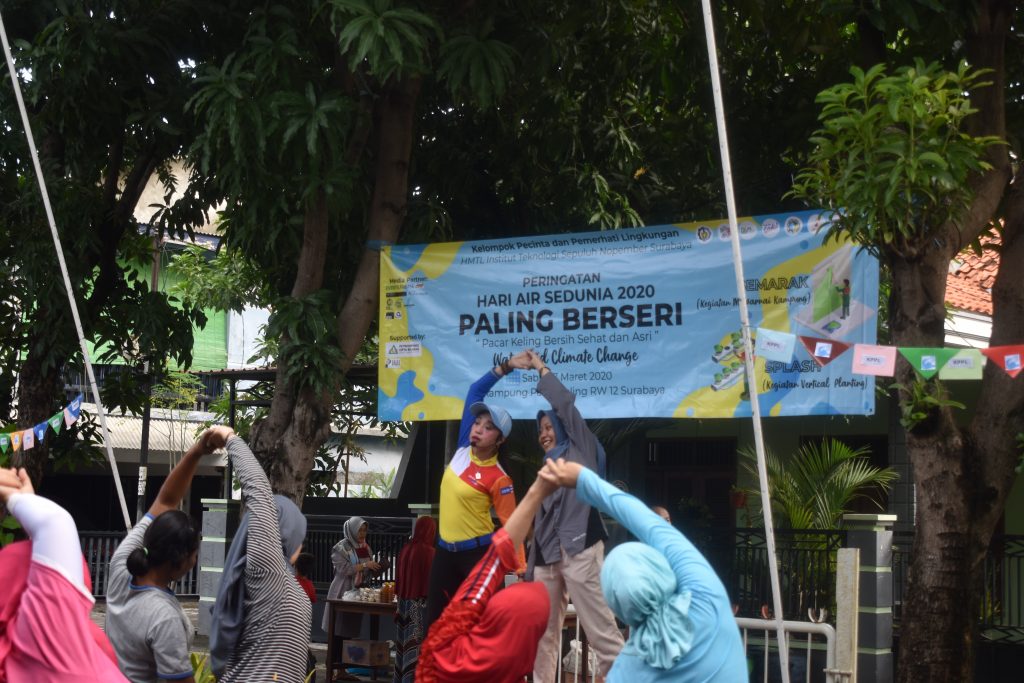
ITS Students Invites Surrounding Communities to Celebrates World Water Day
Water is one of the most vital aspects of human life. Therefore, students of the Department of Environmental Engineering of ITS present an event entitled “Paling Berseri” which involved communities participation in it. The event, which was realized in order to celebrate World Water Day, was successfully held at the Kampung Pacar Keling, Surabaya. This event aims to raise public awareness of water conservation.

ITS Lecturers to Overcome Clean Water Problems in Surrounding Area
The availability of clean water is very important for life, but not infrequently people still experience difficulties in fulfilling it due to various things, one of which is pollution. Following up on this, the Community Service Team (Abmas) of ITS helps people in surrounding area of Surabaya to overcome clear water problems.

Circular Letter of ITS Rector No. T-95007-IT2-TU.00.08-2019
ITS always strives to support SDGs which is very important for life in the campus area. One of them is waste water management. Waste water management at ITS is regulated in Circular Letter of ITS Rector No. T-95007-IT2-TU.00.08-2019 about ITS’ Initiatives towards Sustainable and Environmental Friendly Campus, item A, where in point 3 it is explained that the ITS family strives to encourage efforts to save water by avoiding unnecessary water use and encouraging efforts to utilize water return of wastewater for watering activities, then at point 9 which is to encourage efforts to manage domestic wastewater by managing and recycling efforts.
ITS Lecturers to Overcome Clean Water Problems in Surrounding Area
The availability of clean water is very important for life, but not infrequently people still experience difficulties in fulfilling it due to various things, one of which is pollution. Following up on this, the Community Service Team (Abmas) of ITS helps people in surrounding area of Surabaya to overcome clear water problems.

ITS in Collaborates with Multiple stakeholders to Discuss Management of Rejoso Watershed
The strategic function of the Rejoso River Basin as a source of clean water supply in parts of East Java has decreased from year to year. Soon, the water resources of the Rejoso watershed will be used to meet the needs of the wider East Java community. To find solutions to these problems, the Faculty of Civil, Environmental and Geo-Engineering (FTSLK) Institut Teknologi Sepuluh Nopember (ITS) Surabaya held a Group Forum Discussion (FGD) in collaboration with the East Java Provincial Government and the Rejoso Watershed Care Forum.
ITS to Apply Reverse-Osmosis Membrane Process
It is still common to find well water that contains bacteria and metal compounds, of course, it is quite disturbing in meeting the needs of clean water in the community. Following up on this condition, the Community Service Team (Abmas) of ITS applied the reverse-osmosis membrane process as a method of purifying water for drinking water needs.


ITS Surabaya utilizes sustainable water extraction technologies on associated university grounds off campus. The water resources management/water conservation program is reported on the publication of the article entitled “Designing catchment area for water resources management in ITS campus”.
ITS: Water Eficiency
ITS Recycles Water from Campus Mosque
Catchment area for water resources management at ITS
ITS Lecturers to Overcome Clean Water Problems in Surrounding Area
The availability of clean water is very important for life, but not infrequently people still experience difficulties in fulfilling it due to various things, one of which is pollution. Following up on this, the Community Service Team (Abmas) of ITS helps people in surrounding area of Surabaya to overcome clear water problems.

ITS and East Java Province Council Identify Groundwater Sources Using Geoelectric Technology
Drought which has become an annual disaster in East Java is not enough just to supply clean water as a solution. The East Java BPBD also took the initiative to find a permanent solution by conducting research on potential water sources in dry areas. Research using geoelectric technology to find groundwater sources was carried out by BPBD East Java in collaboration with the ITS Earth Physics Laboratory, Surabaya. Since the beginning of October 2020, the BPBD and ITS teams have been conducted surveys at 100 measurement points spread over 10 areas including Tuban, Lamongan, Bojonegoro, Gresik, Ngawi, Pacitan, Bangkalan, Sampang, Pamekasan and Sumenep regencies.

ITS to Apply Reverse-Osmosis Membrane Process
It is still common to find well water that contains bacteria and metal compounds, of course, it is quite disturbing in meeting the needs of clean water in the community. Following up on this condition, the Community Service Team (Abmas) of ITS applied the reverse-osmosis membrane process as a method of purifying water for drinking water needs.

SDG 6 IN NUMBERS
351,527 m3
Volume of Water Used in the University
20,078
Campus Population
0.00
Percentage of Water Recycled
2 m3
Volume of Water Recycled
486,531 m3
Total Water Consumption
